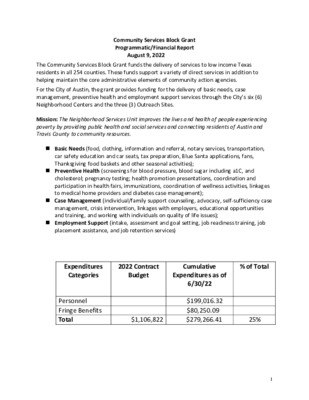Item2_CSBG-Report-August-2022 — original pdf
Backup

Community Services Block Grant Programmatic/Financial Report August 9, 2022 The Community Services Block Grant funds the delivery of services to low income Texas residents in all 254 counties. These funds support a variety of direct services in addition to helping maintain the core administrative elements of community action agencies. For the City of Austin, the grant provides funding for the delivery of basic needs, case management, preventive health and employment support services through the City’s six (6) Neighborhood Centers and the three (3) Outreach Sites. Mission: The Neighborhood Services Unit improves the lives and health of people experiencing poverty by providing public health and social services and connecting residents of Austin and Travis County to community resources. Basic Needs (food, clothing, information and referral, notary services, transportation, car safety education and car seats, tax preparation, Blue Santa applications, fans, Thanksgiving food baskets and other seasonal activities); Preventive Health (screenings for blood pressure, blood sugar including a1C, and cholesterol; pregnancy testing; health promotion presentations, coordination and participation in health fairs, immunizations, coordination of wellness activities, linkages to medical home providers and diabetes case management); Case Management (individual/family support counseling, advocacy, self-sufficiency case management, crisis intervention, linkages with employers, educational opportunities and training, and working with individuals on quality of life issues); Employment Support (intake, assessment and goal setting, job readiness training, job placement assistance, and job retention services) Expenditures Categories 2022 Contract Budget % of Total Cumulative Expenditures as of 6/30/22 Personnel Fringe Benefits Total $1,106,822 $199,016.32 $80,250.09 $279,266.41 25% 1 SRV 3O 4 4E 4E 5 5B 5D 4C 4C 4I 5A 5JJ 7A 7B 7D 7N Transition Out of Poverty Goal Goal Achieved TOP Individuals who transitioned out of poverty 43 12 Success Rate% 28% Austin Public Health Report on PY22 Community Action Plan MISSION: To prevent disease, promote health, and protect the well-being of our community. TOP 5 NEEDS: Housing; Health; Employment; Basic Needs; Education Report Date June 2022 FNPI Outcome Description Target #Enrolled #Achieved Success Rate % Housing Households who avoided eviction Households who avoided eviction (CARES ACT) *2021 1200 1,458 Health and Social/Behavioral Development Individuals who demonstrated improved physical health and well being Individuals who improved skills related to the adult role of parents/caregivers Service Description Tax Preparation Programs Rent Payments Rent Payments (Cares Act) *2021 Utility Payments Immunizations Food Distribution Case Management Eligibility Determinations Transportation Emergency Clothing 3A.1 Total number of volunteer hours donated to the Agency Programmatic/Administrative Updates #Enrolled #Achieved 353 1,458 0 15 86% 122% Success Rate % On hold due to COVID-19 54% 400 50 25 353 0 28 Number Served 768 353 1,451 126 15,315 28 605 15 124 713 2 1. Neighborhood Services Unit Vacancies – Working with HR to fill vacancies. New Manager hired for the South Austin Neighborhood Center. 2. Neighborhood Services – Reopened our Neighborhood Centers to the public on Monday, May 2, 2022. We offer Food Pantry Curbside & HOPE services, Home Delivery Program, Emergency Rental assistance in collaboration with Catholic Charities of Central Texas, Self-Sufficiency case management services and utility assistance through the Austin Energy Plus 1 program. 3. Fresh Foods For Families (FFFF) – The Neighborhood Centers in collaboration with the Central Texas Food Bank holds Fresh Food For Families events that provide free monthly distributions of fruits, vegetables and other fresh foods to low-income families. These distributions supplement existing grocery budgets with much-needed nutritious foods. The events are drive-thru. 4. Home Delivery Program – In collaboration with the Central Texas Food Bank and Amazon, the NSU launched a home delivery program. Eligible individuals (Travis County Resident, “Low Income” and Target Population (Household with children 0-18 or Senior 60+) have begun signing up for monthly deliveries of pre-packed food boxes. Expanded eligibility in August 2021 to include individuals with a disability, Veterans and Active Military members. In June 1,329 Households/3,498 Individuals had food boxes delivered to their doorstep. We have begun efforts to expand the number of deliveries per day from 90 to 120 (Monday – Thursdays). 5. COA Financial Stability Funding – In partnership with Catholic Charities of Central Texas, the Neighborhood Services Unit provides rental assistance to clients facing a crisis that puts their housing at risk. January – June 2022 we assisted 353 people in 102 households avoid eviction using these funds. 6. Emergency Rental Assistance Funding – Austin Public Health has accepted funds from the United States Department of the Treasury, Emergency Rental Assistance Program to provide rental assistance to households that are unable to pay rent due to the COVID-19 pandemic. In partnership with the Austin Area Urban League we are working to stand- up this operation in the next couple of weeks. 7. Austin Energy Plus 1 Program – Serious illness, a recent job loss, or the pandemic can make it difficult for some customers to pay their utility bills. The Plus 1 fund helps by providing emergency financial aid to customers who are having a temporary problem paying their utility bills. 8. NSU Public Health Nursing Update – Our NSU nurses are now also staffing the Monkeypox (MPX) vaccine clinics. This is similar to the rotations for the COVID vaccine clinics and coverage of the nurse line. At this time, the new rotations may impact the number of hours that the nurses have available for their Neighborhood Center activities. 3 Also note that these are smaller clinics with fewer supports, so the nurses may have additional responsibilities around storage, handling, documentation, and reporting. Much gratitude to our nurses who have, for almost 3 years now, tirelessly and with passion and courage worked these responses to ensure our community is educated and protected as much as is humanly possible. 4